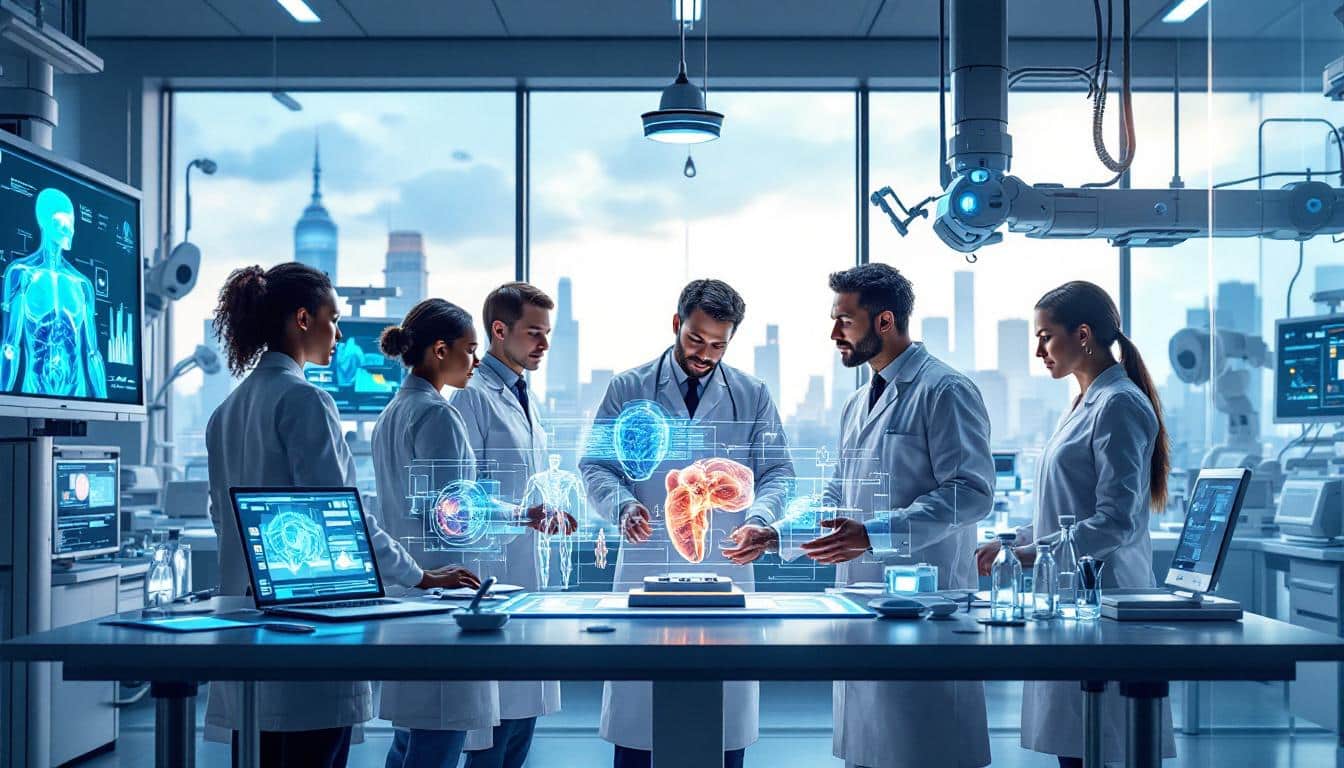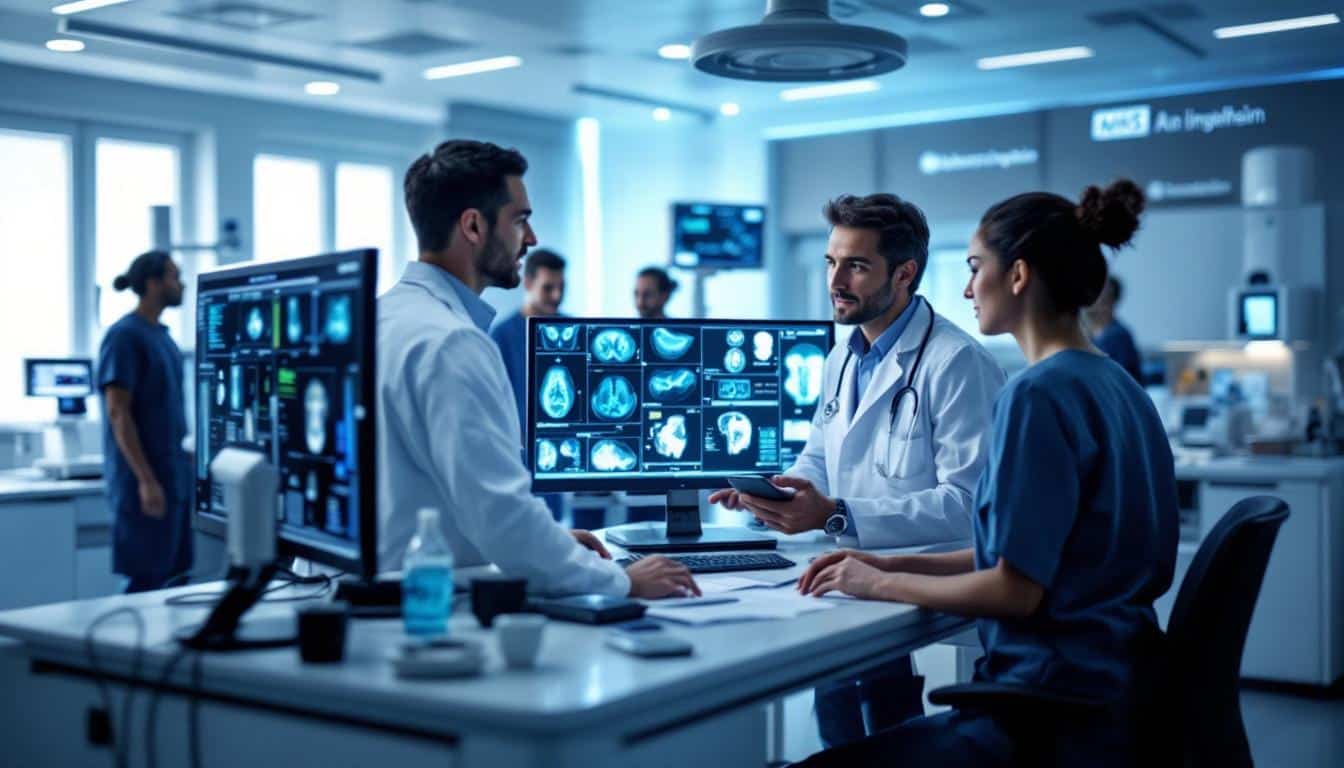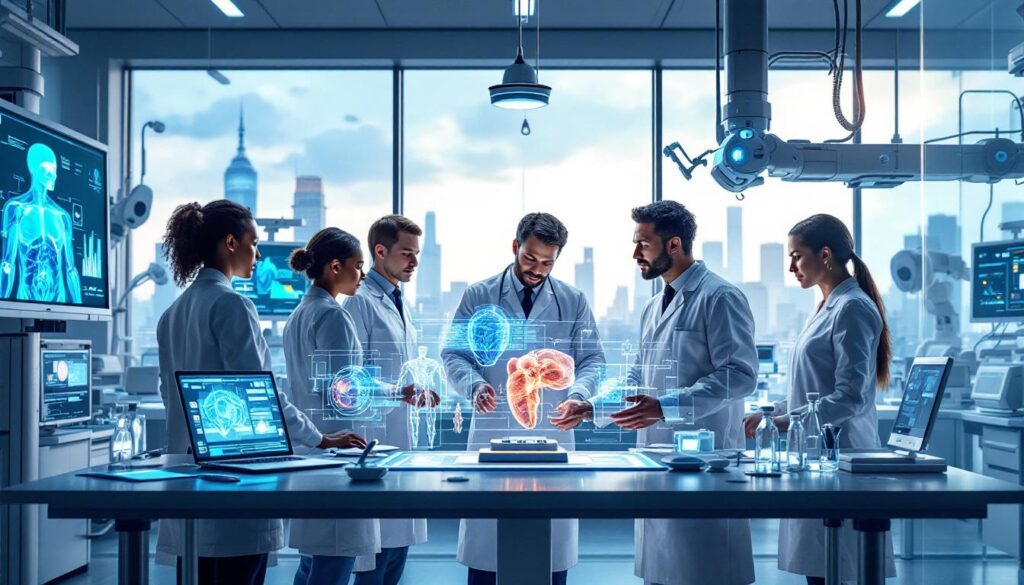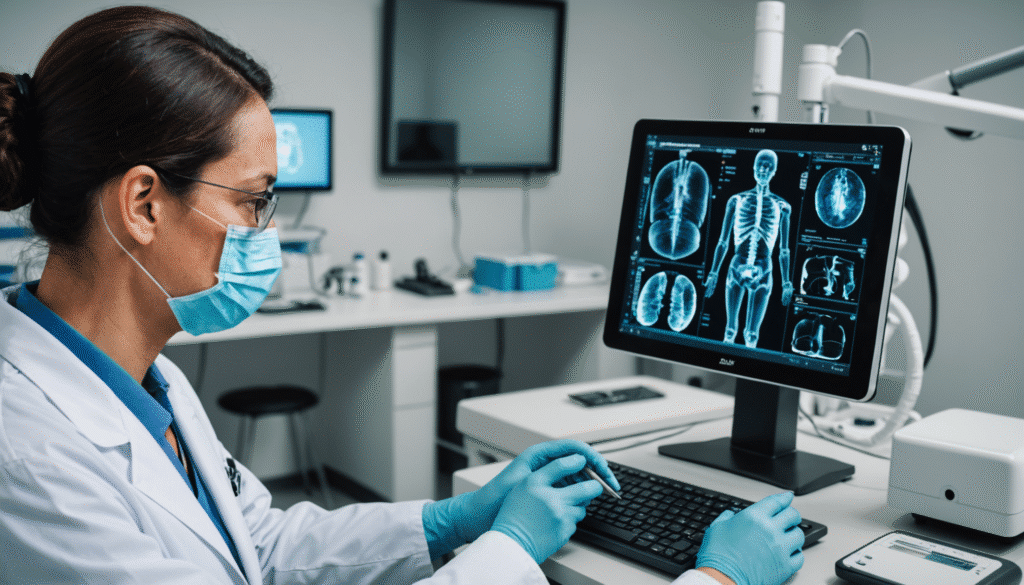Artificial intelligence is redefining our medical approach.
Every day, technologies evolve to better support us.
Welcome to an era where AI and surgery meet.
The advent of generative AI opens new perspectives in the medical field. Intelligent systems can now create innovative content, ranging from medical image analyses to personalized surgical simulations. Google enriches its tools with Gemini technology, offering interactive platforms like Canvas that promote collaboration between doctors and AI. These advances improve the accuracy of diagnoses and optimize surgical interventions through real-time assistance.
quest and google: a strategic alliance to revolutionize generative artificial intelligence
The partnership between Quest and Google marks a significant advancement in the field of generative artificial intelligence. This collaboration aims to merge Quest’s expertise in digital health solutions with Google’s innovative capabilities in AI. Together, they aspire to create smarter and more responsive tools to enhance diagnostics and patient treatment. The integration of Google technologies, such as Gemini and Canvas, will enable the development of applications capable of generating complex medical content, thereby facilitating the work of healthcare professionals.
Thanks to this alliance, healthcare institutions will benefit from more efficient systems for analyzing medical data, planning surgical interventions, and managing patient records. The use of generative AI will also allow for the customization of treatments based on the specific needs of each patient, thereby improving therapy success rates. Furthermore, this collaboration encourages innovation by making advanced technologies more accessible to healthcare professionals, which could potentially transform traditional medical practices.
By combining the strengths of Quest and Google, this initiative could also accelerate the development of new AI-based applications in the medical sector. For example, Google’s natural language processing capabilities could be utilized to improve user interfaces of health management systems, making technology interaction more intuitive for practitioners. Additionally, AI-assisted design tools facilitated by Canvas will allow for the creation of more interactive and personalized medical training programs.
the impact of generative AI in the healthcare sector
Generative artificial intelligence has the potential to revolutionize the healthcare sector in multiple ways. By enabling the autonomous creation of content such as medical images, diagnostic reports, and even treatment plans, generative AI can significantly increase the productivity of healthcare professionals. For example, studies have shown that AI-enabled digital stethoscopes, such as those developed by Eko, can save lives by detecting heart anomalies early that would go unnoticed during traditional manual examinations.
Moreover, generative AI can improve the accuracy of diagnoses by analyzing vast datasets and identifying patterns invisible to the human eye. This capability to process and interpret complex information not only reduces medical errors but also optimizes treatments by tailoring them to the specifics of each patient. Additionally, generative AI facilitates the creation of advanced medical simulations, thus providing valuable tools for training future surgeons and other healthcare professionals.
Another crucial aspect is the enhancement of health data management. With the exponential increase in data generated by medical devices and electronic patient records, generative AI allows for the effective structuring and analysis of this information. This ability to manage large volumes of data contributes not only to better internal organization of healthcare institutions but also to more thorough and rapid medical research.
ge healthcare and autonomous imaging: towards a medical revolution
GE Healthcare is innovating in the field of medical imaging by developing autonomous imaging systems. These new technologies leverage generative artificial intelligence to automate and optimize imaging processes, thereby reducing the time and resources needed to obtain precise and reliable results. Autonomous imaging allows for faster examinations while maintaining a high level of quality, which is essential for early diagnosis and effective treatment of diseases.
The autonomous imaging solutions from GE Healthcare integrate advanced algorithms capable of automatically detecting anomalies in medical images. For example, during an abdominal ultrasound, AI can identify abnormal structures and generate a detailed report without human intervention. This automation not only speeds up the diagnostic process but also frees healthcare professionals to focus on more complex tasks requiring human expertise.
Furthermore, autonomous imaging offers significant benefits in terms of cost reduction and increased efficiency for healthcare institutions. By minimizing the need for manual interventions, hospitals can reduce patient wait times and improve resource management. Additionally, the increased accuracy of diagnoses helps limit medical errors, thus ensuring better quality of care and enhanced patient satisfaction.
GE Healthcare’s initiatives are also part of a broader trend to integrate generative AI into all aspects of medical care. For instance, the company is exploring AI applications for patient record management, surgical intervention planning, and optimizing hospital workflows. These innovations promise to profoundly transform the medical landscape, making healthcare more accessible, efficient, and personalized.
google’s innovations in generative AI: canvas and gemini
Google continues to position itself at the forefront of generative artificial intelligence with its latest innovations, Canvas and Gemini. Canvas represents an interactive space designed for AI-assisted writing and programming, enabling real-time collaboration between users and AI systems. This platform facilitates the creation of complex content by providing intelligent suggestions and automating routine tasks, allowing users to focus on more creative and strategic aspects of their work.
Gemini, on the other hand, is Google’s advanced AI model designed to respond smarter and more contextually to user queries. By integrating Gemini into their applications, Google aims to provide more natural and effective interactions, both for professionals and individuals. This technology is particularly beneficial in the healthcare sector, where it can be used to analyze medical data, assist in clinical decision-making, and improve communication among various stakeholders in the healthcare system.
Google’s innovations in generative AI also have important implications for education and medical training. For example, Canvas can be used to develop realistic simulation programs, allowing medical students to practice surgical procedures in a secure virtual environment. Additionally, Gemini‘s capabilities to analyze and interpret complex information can help researchers identify new treatment pathways and accelerate medical discoveries.
By integrating these technologies into its ecosystem, Google not only offers powerful tools for healthcare professionals but also contributes to creating an environment conducive to continuous innovation. This collaborative and AI-focused approach pushes the boundaries of what is possible in the medical field, paving the way for advancements that will improve healthcare quality and the overall health of populations.
practical applications of generative artificial intelligence in medtech
Generative artificial intelligence finds numerous practical applications in the field of medtech, transforming methods of diagnosis, treatment, and healthcare management. For example, innovative companies such as ENOVACOM use generative AI to develop cutting-edge solutions in medical imaging, enabling earlier and more accurate disease detection. Similarly, Siemens Healthineers has launched automated AI for abdominal ultrasounds, revolutionizing how these examinations are conducted and interpreted.
Another notable example is Harrison.ai, which unveiled innovations in radiology through genAI, a generative AI solution specifically designed to analyze radiological images with increased precision. These advancements not only reduce the workload for radiologists but also improve the speed and reliability of diagnoses.
Moreover, generative AI plays a crucial role in personalizing medical treatments. By analyzing genetic data, medical histories, and responses to past treatments, AI can generate tailored treatment plans for each patient. This personalized approach increases the likelihood of therapy success and reduces side effects, thereby providing a better quality of life for patients.
The integration of generative AI into patient record management is also an emerging trend. By automating data entry and analysis, AI enables more efficient and secure management of sensitive information. This not only facilitates the work of healthcare professionals but also ensures better protection of patient privacy.
Finally, generative AI contributes to medical research by accelerating the discovery of new treatments and optimizing clinical trials. By simulating complex scenarios and analyzing massive volumes of data, AI can identify trends and correlations that would otherwise be difficult to detect. This allows researchers to focus on the most promising aspects of their studies, thus accelerating the development of new therapies and medical technologies.
the future of generative AI in medtech
The future of generative artificial intelligence in medtech looks promising, with numerous innovations on the horizon. As AI technologies continue to develop, their integration into healthcare systems could become even deeper and more extensive. Companies like Arcadia, led by visionary leaders such as Aneesh Chopra, are exploring new ways to leverage AI to improve health data interoperability, thus facilitating better care coordination among different stakeholders in the medical system.
Moreover, the personalization of care through generative AI is expected to become the norm, enabling more targeted and effective treatments. Advances in machine learning will allow AI systems to better understand the individual needs of patients and adapt accordingly. This could also include the creation of intelligent medical devices capable of responding in real-time to changes in patients’ health status.
Additionally, the expansion of generative AI capabilities in predictive analysis could transform medical prevention. By anticipating disease risks and proposing personalized preventive interventions, AI could play a key role in reducing healthcare costs and improving clinical outcomes. Advanced AI solutions could also facilitate the management of epidemics and health crises by quickly analyzing vast amounts of data to identify trends and appropriate responses.
However, challenges remain numerous, particularly regarding data protection and AI technology regulation. It will be essential to find a balance between innovation and security, ensuring that AI systems adhere to ethical standards and protect patient privacy. Collaborations like the one between Quest and Google will play a crucial role in developing policies and standards that enable responsible and beneficial adoption of generative AI in the healthcare sector.
In conclusion, the integration of generative artificial intelligence in medtech promises to transform many aspects of healthcare, offering unprecedented opportunities to improve treatment quality, optimize medical processes, and personalize care for each patient. With continuous advancements and strategic collaborations, the future of AI in healthcare looks bright and full of innovative possibilities.













